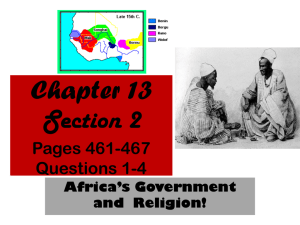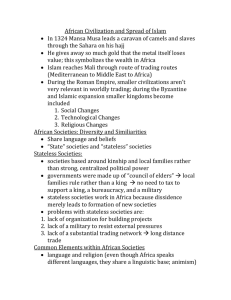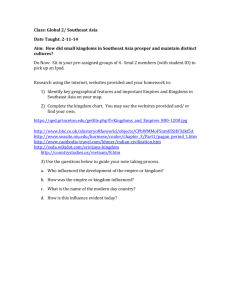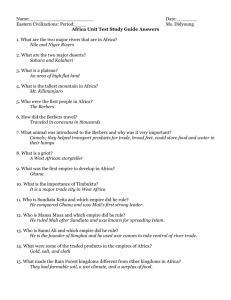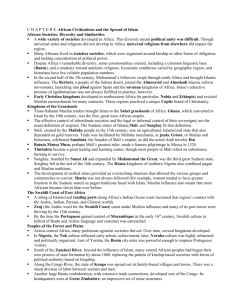Sub-Saharan Trading States and Kingdoms
advertisement
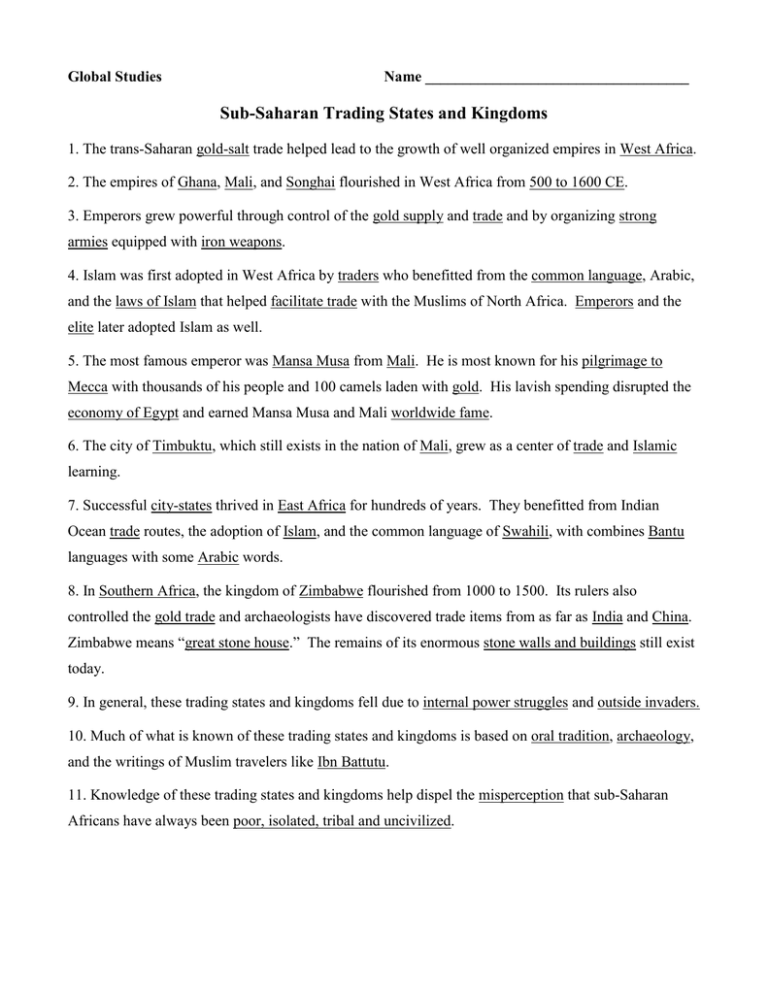
Global Studies Name ___________________________________ Sub-Saharan Trading States and Kingdoms 1. The trans-Saharan gold-salt trade helped lead to the growth of well organized empires in West Africa. 2. The empires of Ghana, Mali, and Songhai flourished in West Africa from 500 to 1600 CE. 3. Emperors grew powerful through control of the gold supply and trade and by organizing strong armies equipped with iron weapons. 4. Islam was first adopted in West Africa by traders who benefitted from the common language, Arabic, and the laws of Islam that helped facilitate trade with the Muslims of North Africa. Emperors and the elite later adopted Islam as well. 5. The most famous emperor was Mansa Musa from Mali. He is most known for his pilgrimage to Mecca with thousands of his people and 100 camels laden with gold. His lavish spending disrupted the economy of Egypt and earned Mansa Musa and Mali worldwide fame. 6. The city of Timbuktu, which still exists in the nation of Mali, grew as a center of trade and Islamic learning. 7. Successful city-states thrived in East Africa for hundreds of years. They benefitted from Indian Ocean trade routes, the adoption of Islam, and the common language of Swahili, with combines Bantu languages with some Arabic words. 8. In Southern Africa, the kingdom of Zimbabwe flourished from 1000 to 1500. Its rulers also controlled the gold trade and archaeologists have discovered trade items from as far as India and China. Zimbabwe means “great stone house.” The remains of its enormous stone walls and buildings still exist today. 9. In general, these trading states and kingdoms fell due to internal power struggles and outside invaders. 10. Much of what is known of these trading states and kingdoms is based on oral tradition, archaeology, and the writings of Muslim travelers like Ibn Battutu. 11. Knowledge of these trading states and kingdoms help dispel the misperception that sub-Saharan Africans have always been poor, isolated, tribal and uncivilized. Global Studies Name ___________________________________ Sub-Saharan Trading States and Kingdoms 1. The trans-Saharan __________________ trade helped lead to the growth of well organized empires in _______________________. 2. The empires of ____________, _____________, and ______________ flourished in West Africa from _________________________. 3. Emperors grew powerful through control of the __________________ and ____________ and by organizing __________________ equipped with ____________________. 4. Islam was first adopted in West Africa by ______________ who benefitted from the _________________________ Arabic, and the _______________________ that helped _________________________ with the Muslims of North Africa. ________________ and the ______________later adopted Islam as well. 5. The most famous emperor was ________________________ from ______________. He is most known for his _____________________________ with thousands of his people and 100 camels laden with ___________. His lavish spending disrupted the ________________________ and earned Mansa Musa and Mali _________________________. 6. The city of ___________________, which still exists in the nation of ____________, grew as a center of ______________ and __________________ learning. 7. Successful __________________ thrived in __________________ for hundreds of years. They benefitted from Indian Ocean ___________ routes, the adoption of ____________, and the common language of _______________, with combines ______________ languages with some _____________ words. 8. In _______________________, the kingdom of _________________ flourished from 1000 to 1500. Its rulers also controlled the _______________ and archaeologists have discovered trade items from as far as ___________ and ___________. Zimbabwe means “__________________________.” The remains of its enormous _________________________________ still exist today. 9. In general, these trading states and kingdoms fell due to __________________________________ and ___________________________. 10. Much of what is known of these trading states and kingdoms is based on _____________________, _____________________, and the writings of Muslim travelers like ___________________________. 11. Knowledge of these trading states and kingdoms help dispel the ____________________ that subSaharan Africans have always been _______________________________________________.
